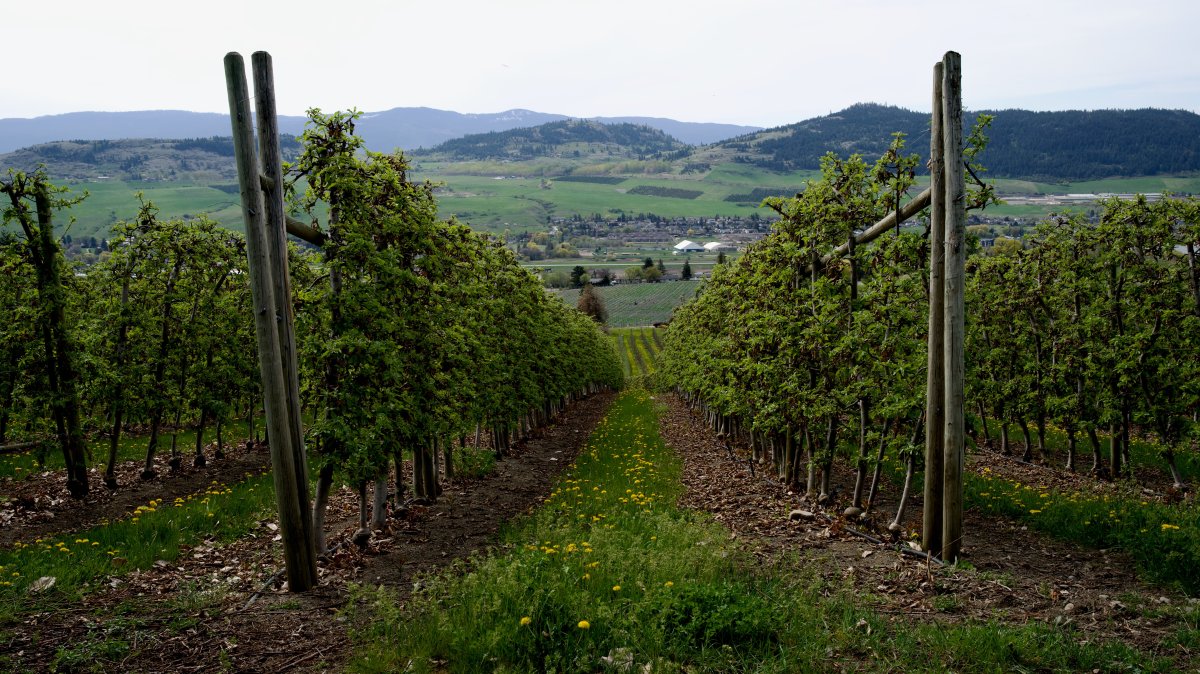Katie Sardinha followed in her family’s footsteps and continued a tradition of fruit farming in the Okanagan.

It’s not a path many her age tread anymore, given both the environmental and economic challenges that have knocked the industry on its back in recent years.
“The average age of a farmer is over 65, and new entrants … there’s not many of us,” Sardinha said at a BC Fruit Growers Association meeting.
“There was a census done a couple of years ago and it showed that young farmers were actually getting into the business and then dropping out a couple years later. They weren’t sure why. I think I know why. I think it’s stress and burnout.”

The farming participation rate was apparent to onlookers simply by the number of attendees at the annual meeting. Just a decade earlier, when Sardinha’s late father Joe was the president of the association, the membership filled convention centres, while the crowd Wednesday was around a third of what it once was.
“We have a very consolidated retail situation in Canada that is driving our prices down. We’ve been really stagnant in terms of what we’ve been getting for years,” Sardinha said.
“Then we have the climate. We have farmer burnout and stress. We have a lot of debt issues and a lot of trouble getting insurance. Some of the programs are not compensating us at the rates that they used to be and we also have a lot of new regulations that we’re having to fit into and that’s adding a lot of complication to our work.”
All in all, conditions are bleak, Corky Evans, former NDP agriculture minister, indicated. He was invited to the meeting to speak about politics, the Agricultural Land Reserve and support for farming in general.
The latter is in short supply, he said.

“My message essentially is it’s a very weird and unfortunate contradiction that we live in the part of Canada and North America with the best support for agricultural land and the worst support for the work that goes on for farming,” Evans said.
“This year, of course, there’s freezing, and that’s a crisis, but it wouldn’t bankrupt people if they were solvent.
“In every other province in Canada, the support for farming is two or three or sometimes four times what it is in British Columbia. We essentially abandoned support for the work of farming way back in the 1980s and every year they publish a list of all the provinces and how much they support farming. B.C. has been the last on that list, below Newfoundland, for 30 years because demographics mean you can be the government of B.C. without winning a single seat past Hope, because all the people live down here.”
Evans said no organization is out there advocating for farmers anymore, which may be why all the money in farming goes to retailers these days.
“There’s an advertising program for apples that growers support but they show where the money has gone,” Evans said. “It all goes to the retailers. The farmers never get a dime more.
“The retail sector in B.C. is like the iron fist and farmers get nothing.”
The government in the ’90s abandoned the support for farmers for the price of production and now they’re on their own, Evans said.
“Can you imagine, ‘OK, I got 20 acres of orchard and I’m up against Costco and Walmart and Safeway?'” he said. “Like, you’re nothing.”
Deep Brar, vice-president of the BC Fruit Growers Association, has a 150-acre farm in Summerland, where he grows apples, peaches and ground crops.
He’s seen production and price declines and in the face of both, the lack of government support is, he says, notable.
- Thousands of Canada’s rail workers have a strike mandate. What happens now?
- Bird flu: Experts urge more surveillance in Canada — before it’s too late
- TD Bank hit with $9.2M fine over failing to report suspicious transactions
- Can the Bank of Canada cut rates before the U.S.? What Macklem, economists say
“We don’t have any government support at this point, basically,” Brar said. “So we’re we’re advocating for a lot of more programs or injection into the industry.
“However, it’s been (falling on) deaf ears at this point. ”
Concerns about apples have been ongoing for the better part of seven years, but problems have extended to cherries, wine grapes and just about every agricultural offering in the valley in more recent years.
“So now what does the government do? The reason I took this position was because I am a full-on grower, I have no side job , but this scares me and it keeps me up at night,” he said.
“How do I make money if last year I didn’t make money? And then this year, I don’t have a crop and the programs don’t work for us?”

He said he wonders if he should sell because given that the property is ALR land, there’s no subdividing for building townhouses or the like.
“So what do I do?” he said. “That’s a question I always have for the government … what do you want me to do if you guys don’t want to support us? What do I do?”




Comments